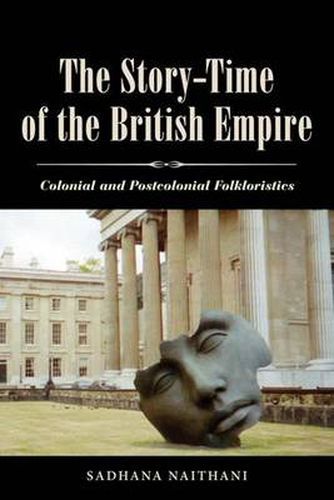Readings Newsletter
Become a Readings Member to make your shopping experience even easier.
Sign in or sign up for free!
You’re not far away from qualifying for FREE standard shipping within Australia
You’ve qualified for FREE standard shipping within Australia
The cart is loading…






This title is printed to order. This book may have been self-published. If so, we cannot guarantee the quality of the content. In the main most books will have gone through the editing process however some may not. We therefore suggest that you be aware of this before ordering this book. If in doubt check either the author or publisher’s details as we are unable to accept any returns unless they are faulty. Please contact us if you have any questions.
In The Story-Time of the British Empire, author Sadhana Naithani examines folklore collections compiled by British colonial administrators, military men, missionaries, and women in the British colonies of Africa, Asia, and Australia between 1860 and 1950. Much of this work was accomplished in the context of colonial relations and done by non-folklorists, yet these oral narratives and poetic expressions of non-Europeans were transcribed, translated, published, and discussed internationally. Naithani analyzes the role of folklore scholarship in the construction of colonial cultural politics as well as in the conception of international folklore studies.
Since most folklore scholarship and cultural history focuses exclusively on specific nations, there is little study of cross-cultural phenomena about empire and/or postcoloniality. Naithani argues that connecting cultural histories, especially in relation to previously colonized countries, is essential to understanding those countries’ folklore, as these folk traditions result from both internal and European influence. The author also makes clear the role folklore and its study played in shaping intercultural perceptions that continue to exist in the academic and popular realms today. The Story-Time of the British Empire is a bold argument for a twenty-first-century vision of folklore studies that is international in scope and that understands folklore as a transnational entity.
$9.00 standard shipping within Australia
FREE standard shipping within Australia for orders over $100.00
Express & International shipping calculated at checkout
This title is printed to order. This book may have been self-published. If so, we cannot guarantee the quality of the content. In the main most books will have gone through the editing process however some may not. We therefore suggest that you be aware of this before ordering this book. If in doubt check either the author or publisher’s details as we are unable to accept any returns unless they are faulty. Please contact us if you have any questions.
In The Story-Time of the British Empire, author Sadhana Naithani examines folklore collections compiled by British colonial administrators, military men, missionaries, and women in the British colonies of Africa, Asia, and Australia between 1860 and 1950. Much of this work was accomplished in the context of colonial relations and done by non-folklorists, yet these oral narratives and poetic expressions of non-Europeans were transcribed, translated, published, and discussed internationally. Naithani analyzes the role of folklore scholarship in the construction of colonial cultural politics as well as in the conception of international folklore studies.
Since most folklore scholarship and cultural history focuses exclusively on specific nations, there is little study of cross-cultural phenomena about empire and/or postcoloniality. Naithani argues that connecting cultural histories, especially in relation to previously colonized countries, is essential to understanding those countries’ folklore, as these folk traditions result from both internal and European influence. The author also makes clear the role folklore and its study played in shaping intercultural perceptions that continue to exist in the academic and popular realms today. The Story-Time of the British Empire is a bold argument for a twenty-first-century vision of folklore studies that is international in scope and that understands folklore as a transnational entity.